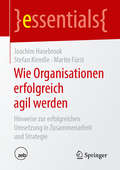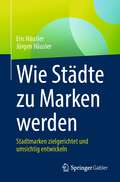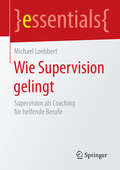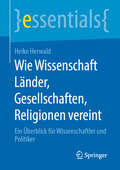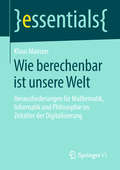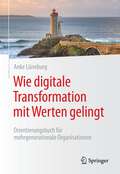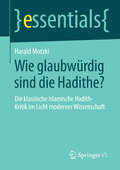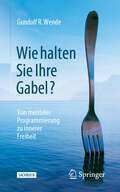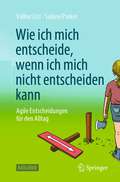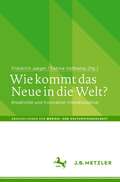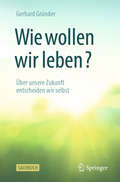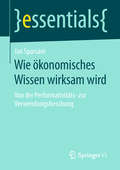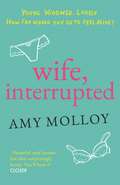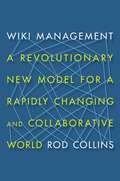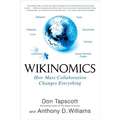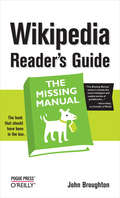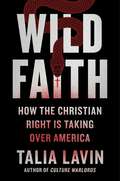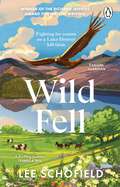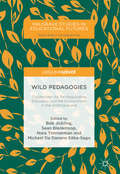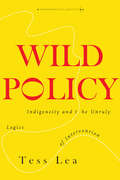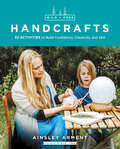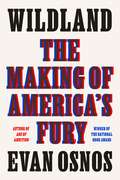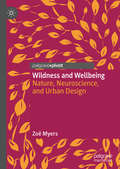- Table View
- List View
Widows: North America
by Helena Znaniecka LopataThe volume examines two communities in Canada, a Florida retirement community, and communities in Ohio, Nebraska, and California, as well as the relative situations of homeowners, blacks, and poor ethnic populations.
Widows: The Middle East, Asia, and the Pacific
by Helena Znaniecka LopataThis volume analyzes the support systems and lifestyles of widows in Australia, the Philippines, Korea, Iran, China, India, Turkey, and Israel.
Wie Organisationen erfolgreich agil werden: Hinweise zur erfolgreichen Umsetzung in Zusammenarbeit und Strategie (essentials)
by Joachim Hasebrook Stefan Kirmße Martin FürstViele Unternehmen haben agile Methoden in ihren Arbeitsalltag integriert. Oft stellen sie fest, dass neue Ideen und Entwicklungsvorsprünge durch agile Arbeit von starren Organisationsstrukturen, Ziel- und Anreizsystemen ausgebremst werden. Agilität funktioniert nur, wenn zur agilen Zusammenarbeit auch agile Organisationsstrukturen und agile Unternehmensstrategien hinzukommen. Auf der Basis eigener Forschung und umfangreicher Projekterfahrungen zeigen die Autoren, für welche Unternehmensbereiche und Aufgaben Agilität geeignet ist und für welche nicht, welcher nachweisbare Nutzen und welche Risiken durch Agilität entstehen und wie der Weg zur agilen Organisation erfolgreich gemeistert werden kann.
Wie Städte zu Marken werden: Stadtmarken zielgerichtet und umsichtig entwickeln
by Jürgen Häusler Eric HäuslerDieses Buch beschreibt, wie der fragile und langwierige Prozess der Entwicklung einer Stadtmarke umsichtig gestaltet werden kann. Notwendige Hintergründe werden erläutert, von zahlreichen Erfahrungen wird berichtet, zielführendes Stadtmarkenmachen wird vielfältig inspiriert.Der Traum jeder Markenmacher*in: eine Stadt zu einer starken Stadtmarke – vielleicht sogar zu einem Mythos – zu entwickeln. Dabei bleibt die Mythenbildung ein Kuriosum. Erfolgt sie zielgerichtet, existieren einschlägige Erfolgsrezepte, können die Verantwortlichen identifiziert werden? Vor allem: Lässt sich der Prozess nachbilden? Wie gehen Markenmacher*innen mit der Komplexität der Phänomene Stadt und Stadtmarke handwerklich um? Wie verleihen sie dem mühevollen Prozess der Entstehung einer Stadtmarke vernünftige Erfolgsaussichten? Wie begegnen Markenmacher*innen der häufig beißenden Kritik von außen und den nagenden Selbstzweifeln? Erfolgreiche Stadtbilder entspringen den Irrungen und Wirrungen komplexer und mitunter zufälliger Prozesse. Im Zuge des globalen Städtewettbewerbs wird dieser evolutionäre Prozess mit den Errungenschaften des Handwerks des Markenmachens angereichert. Dies ist noch keine Erfolgsgarantie. Der Erfolg hängt von zahlreichen Voraussetzungen ab, die ausführlich thematisiert werden. Abschließend werden Handwerksregeln für gutes und zugleich sensibles Stadtmarkenmachen genannt.
Wie Supervision gelingt: Supervision als Coaching für helfende Berufe (essentials)
by Michael LoebbertSupervision wird von Michael Loebbert in diesem essential dezidiert als Coaching gefasst und diskutiert - das macht einen Unterschied: Der Autor zeigt, dass alle beteiligten Akteure sich an ihrer Leistung messen lassen d#65533;rfen und m#65533;ssen, ob und wie Hilfe wirklich gelingt. Mit diesem Ansatz kn#65533;pft er an die angels#65533;chsische Diskussion und Weiterentwicklung von Supervision als Beratungsform pers#65533;nlicher Prozessberatung f#65533;r helfende Berufe an. Spezifische Methoden, wie #65533;bertragungsanalyse mit SCORE und das Sieben-Augen-Modell f#65533;r Supervision werden zum ersten Mal auf Deutsch dargestellt.
Wie Wissenschaft Länder, Gesellschaften, Religionen vereint: Ein Überblick für Wissenschaftler und Politiker (essentials)
by Heiko HerwaldUnsere heutige Welt ist geprägt von einer rasanten technologischen Entwicklung. Die daraus resultierende digitale Reizüberflutung, das unermessliche Sammeln von Daten und die Entwicklung von Algorithmen, die für uns jetzt schon Entscheidungen übernehmen, haben das Wertesystem der Menschen verändert. Anhand des Höhlengleichnisses von Platon beschreibt der Autor, wieso der Mensch seine Unabhängigkeit aufgibt und er sich von einem Homo sapiens zu einem Homo accumulans (speichernder Mensch) entwickelt hat. Er zeigt auf, warum Paradigmenwechsel in Religion, Politik und Wissenschaft für die Weiterentwicklung der Menschheit von großer Bedeutung waren und wieso dies für die Wissenschaft auch weiterhin notwendig sein wird, um Lösungen für globale Probleme zu entwickeln.
Wie berechenbar ist unsere Welt: Herausforderungen Für Mathematik, Informatik Und Philosophie Im Zeitalter Der Digitalisierung (Essentials)
by Klaus MainzerKlaus Mainzer legt in diesem essential dar, dass die Zukunft von KI und Digitalisierung eine nüchterne Analyse erfordert, die Grundlagenforschung mit Anwendung verbindet. Berechenbarkeits- und Beweistheorie können dazu beitragen, Big Data und Machine Learning sicherer zu bewältigen. Dabei zeigt sich, dass die komplexen Herausforderungen der digitalen und analogen Welt in Grundlagenfragen der Mathematik, Informatik und Philosophie tief verwurzelt sind.
Wie digitale Transformation mit Werten gelingt: Orientierungsbuch für mehrgenerationale Organisationen
by Anke LüneburgWerte sind Leuchttürme der digitalen und der kulturellen Transformation. Das Buch zur digitalen Transformation durch Werte zeigt, dass die digitale Transformation und das erfolgreiche Recruiting von Talenten nur dann erfolgreich umgesetzt werden können, wenn Führungskräfte in Unternehmen und Verwaltungen Klarheit über ihre eigenen biografischen Werte und deren Wurzeln gewinnen. Nur so können sie ihren Teams die nötige psychologische Sicherheit bieten.Praxisbezogen zeigt es Ihnen Ursachen und Hindernisse, durch die Organisationen und Führungskräfte bei großen Herausforderungen wie der digitalen Transformation und dem Fachkräftemangel ausgebremst werden.Es erklärt die üblichen Fallstricke und hilft Ihnen zu erkennen, warum neue Konzepte und Veränderungen nicht in die Praxis umgesetzt werden oder Mitarbeiter der Generationen Y und Z nur kurz im Unternehmen bleiben. Durch die aufgezeigten Lösungswege zur notwendigen Veränderungsdurchführung erhalten Sie eine klare Orientierung, die Ihnen hilft, die genannten Hindernisse zu beseitigen. Dazu erfahren Sie, wie durch eine Passung persönlicher und unternehmerischer Werte ein erfolgreiches Change-Management, HR-Management und Führungskonzept aufgebaut werden kann.Zielgruppen: Alle diejeningen, die den digitalen Wandel zeitnah umsetzen und ihr Unternehmen bzw. ihre Organisation auf der Basis passender Werte verbessern wollen, d.h. Führungskräfte aller Ebenen, Unternehmensleitungen, HR-Abteilungen, Organisations- und Personalentwickler:innen, Unternehmensberater:innen, Coaches, Trainer:innen und Mediator:innen Zur Autorin: Anke Lüneburg ist professionell ausgebildete Leadership Coach, Master-Coach DGfC, Mediatorin BM® sowie Beraterin und war 25 Jahre Führungskraft in Wirtschaftsbetrieben und öffentlichen Organisationen. Als Sparringspartnerin begleitet sie Organisationen und Führungskräfte, die eine kulturelle oder digitale Transformation umsetzen wollen und ist Lehrbeauftragte im Bereich Wirtschaftspsychologie. Seit 2018 ist sie Autorin bei Springer mit den Themen Leadership, Führung, Generationen, Arbeit 4.0 und Persönlichkeitsentwicklung und schreibt mit ebenso großer Freude Blogtexte und Artikel.
Wie glaubwürdig sind die Hadithe?: Die klassische islamische Hadith-Kritik im Licht moderner Wissenschaft (essentials)
by Harald MotzkiDer Aufsatz gibt einen Überblick über die Anstrengungen der muslimischen Gelehrten, die Glaubwürdigkeit der Hadithe festzustellen. Diese Überlieferungen vom Propheten Muhammad sind für die Muslime nach dem Koran die zweite bedeutende Quelle, aus der sie Richtlinien für ihren Glauben, ihr Denken und Handeln beziehen. Schon die muslimischen Rechtsgelehrten der ersten Jahrhunderte des Islam beschäftigte die Frage der Glaubwürdigkeit dieser Überlieferungen, die seit dem 3. Jh. H. in anerkannten Sammlungen vorliegen. In dieser Zeit entwickelten die Gelehrten auch eine Hadith-Kritik, die Kriterien festlegte, mit deren Hilfe man den Grad der Glaubwürdigkeit einzelner Überlieferungen bestimmen konnte. Der Beitrag stellt die Auffassungen der muslimischen Rechts- und Hadith-Gelehrten zu diesem Thema dar und evaluiert ihre Lösungen aus der Sicht der westlichen historisch-kritischen Wissenschaft.
Wie halten Sie Ihre Gabel?: Von mentaler Programmierung zu innerer Freiheit
by Gundolf R. WendeWer mentale Programmierungen erkennt und bei sich ändert, wird innerlich souverän und kann frei und selbst bestimmt gestalten. In der Regel ist uns nicht bewusst, dass sich bereits in frühester Kindheit und Jugend die Art und Weise unseres Denkens und Handelns manifestiert. Daran ändert sich meist während unseres ganzen Lebens recht wenig. Doch was, wenn Wirtschaft, Gesellschaft und Arbeitswelt sich jetzt so schnell und radikal wandeln wie nie zuvor – während wir unbewusst bei alten Programmierungen bleiben? Wir werden innerlich unsicher, agieren zaghaft und unsouverän. Es mangelt uns an mentaler Flexibilität und psychologischer Sicherheit, um den Wandel zu gestalten. Wir sind häufig im Widerstand und klammern uns an Hergebrachtes, ohne wirklich zu begreifen, warum. Wir verstehen die Programme dahinter nicht.Das Buch richtet sich an ein breites Publikum. Es spricht all diejenigen an, die das Gefühl haben, „festzustecken“ und die freier und selbst bestimmter leben möchten. Leistungsorientierte Menschen in verantwortungsvollen Positionen in Wirtschaft, Politik, Wissenschaft, Kultur etc., suchen in einer brüchigen, nicht-linearen Welt einen inneren Anker, um mutig und inspiriert Neues gestalten zu können.
Wie ich mich entscheide, wenn ich mich nicht entscheiden kann: Agile Entscheidungen für den Alltag
by Volker List Sabine ParkerWie entscheide ich mich, wenn ich mich nicht entscheiden kann? Im Alltag müssen wir manchmal schwierige Entscheidungen treffen. Häufig tun wir uns schwer und sind unsicher, wie wir uns entscheiden sollen. Wie handeln wir in solchen Situationen, wenn wir hilflos vor einem Dilemma stehen? Lesen Sie dazu die inspirierenden Stories von acht unterschiedlichen Menschen und Alltagssituationen. Die exemplarischen, ansprechend verfassten und humorvoll illustrierten Beispielgeschichten informieren über die inneren Kämpfe mit typischen Problemen, für die es scheinbar keine richtige Lösung gibt. Wie geht es weiter? Erfahren Sie, wie sich die Protagonisten mit den Methoden des agilen Handelns aus den gefühlt ausweglosen menschlichen Verstrickungen befreien. Dieser Ratgeber wird Sie für den Umgang mit Widrigkeiten und zur Lösungsfindung inspirieren und Ihnen somit bei Entscheidungsprozessen sowohl im privaten und beruflichen Alltag bedeutend weiterhelfen.Die Autoren Volker List (*1951) ist Doktor der Philosophie, Germanist, Politikwissenschaftler, Pädagoge, Business-Coach, Gründer der Forschungseinrichtung Angewandte Theaterforschung und Autor zahlreicher Publikationen. Seine Schwerpunkte sind die Gestaltung von Change-Prozessen mit kreativen Methoden, Rhetorik- und Präsentationstrainings sowie die Entwicklung innovativer Lernkonzepte. Sabine Parker M.A. (*1967) ist Personalentwicklerin, Kultur- und Theaterpädagogin, Gründerin und geschäftsführende Gesellschafterin der aisthetos akademie. Ihre Schwerpunkte sind die Personalentwicklung mit handlungsorientierten Methoden sowie die Ausbildung von Theaterpädagogen und Lehrkräften. Sie berät, trainiert und begleitet Menschen, Organisationen und Teams auf dem Weg zu mehr Kreativität und Agilität.
Wie kommt das Neue in die Welt?: Kreativität und Innovation interdisziplinär (Abhandlungen zur Medien- und Kulturwissenschaft)
by Friedrich Jaeger Sabine VoßkampKreativität ist Motor gesellschaftlichen Wandels, künstlerischer Innovation und wissenschaftlichen Erkenntnisfortschritts. Die Beiträge des Bandes gehen der Frage nach, wie in Wirtschaft und Politik, Kunst und Kultur, Wissenschaft und Religion auf jeweils spezifische Weise „Neues“ entsteht oder historisch entstanden ist. Sie analysieren die Rolle von Kreativität in diesen Bereichen, beschreiben die historischen Umstände ihrer Entstehung sowie ihre kulturellen Ausdrucksformen. Der interdisziplinäre, kulturwissenschaftlich fokussierte Ansatz bringt so die gesellschaftstheoretischen Grundlagen, die ästhetischen Implikationen und die wissenskulturellen Aspekte des Kreativitätsbegriffs gleichermaßen zur Geltung.
Wie wollen wir leben?: Über unsere Zukunft entscheiden wir selbst
by Gerhard GründerStellen Sie sich auch die Frage, wie stark Ihr Denken, Ihr Fühlen und Ihr Verhalten durch Ihre Gene und Ihre Biologie bestimmt sind? Haben Sie Zweifel daran, dass der Eingriff in unsere Hirnchemie uns zu glücklicheren und zufriedeneren Menschen macht? Sind Sie skeptisch, dass Computeralgorithmen Ihr Wesen als Mensch erfassen können?Dieses Sachbuch stellt das Weltbild des „göttlichen Menschen“ (Harari), in dem der Mensch durch seine Biologie determiniert ist und die Medizin zu seiner Optimierung dient, infrage. Der Autor zeigt, dass wir die aktiven Gestalter unserer Lebensbedingungen sind und damit über die eigene physische und psychische Gesundheit bestimmen.Lassen Sie sich anregen zur Mitarbeit bei der Gestaltung der Zukunft einer menschlichen Gesellschaft, in der wir zu entscheiden haben, wo wir leben, wie wir miteinander leben, wie wir arbeiten und wie wir uns bilden. Zielgruppen:Ideal für alle, die sich für die Grundlagen von Hirnforschung, Psychologie und Psychiatrie interessieren und die sich Gedanken über das Wesen des Menschen und dessen Zukunft machen.Zum Autor: Prof. Dr. Gerhard Gründer, Psychiater und Psychotherapeut, ist Professor an der Universität Heidelberg. Er leitet die Abteilung für Molekulares Neuroimaging am Zentralinstitut für Seelische Gesundheit in Mannheim.
Wie ökonomisches Wissen wirksam wird: Von der Performativitäts- zur Verwendungsforschung (essentials)
by Jan SparsamDie Erforschung der Performativität der Wirtschaftswissenschaft gehört heute zum Kanon der neueren Wirtschaftssoziologie. Das essential verfolgt die Performativitätsforschung in ihrer Entstehung aus der Akteur-Netzwerk-Theorie zurück und rekonstruiert die zentralen Annahmen ihrer Haupttexte. Auf der Grundlage einschlägiger Kritiken dieses Forschungsprogramms, ausgewählter Beispiele daran anschließender Studien sowie analytischer Desiderata wird ein möglicher analytischer Richtungswechsel der Performativitätsforschung diskutiert. Dies ist mit dem Plädoyer für eine Soziologie ökonomischen Wissens als empirische Verwendungs- und Wirkungsforschung verbunden.Der Autor Dr. Jan Sparsam ist wissenschaftlicher Mitarbeiter im Projekt „Vom Modell zur Steuerung. Der Einfluss der Wirtschaftswissenschaft auf die politische Gestaltung der Finanzmärkte durch Zentralbanken“ am Institut für Soziologie der LMU München.
Wife, Interrupted
by Amy MolloyMy story begins where most women hope theirs will end – with a big, white wedding. After all, isn’t that how every good fairy tale finishes? I thought so. And at 23 it seemed my ‘happy ever after’ was secure.I’d met the man of my dreams whilst on a gap year in Australia. Less than a month later he proposed and I accepted. But within twelve months he was diagnosed with terminal cancer and though we were able to marry he died just three weeks later. You’d never guess I was a widow at 23. I’ve learnt to hide it well. Because what choice do you have when you’ve lost the love of your life almost as soon as you found him? The way I saw it, there were only two options...A) Dress in black, become a recluse and watch your wedding video on a loopORB) Decide falling in love again is out of the question and choose an easy, uncomplicated alternative – sex...Funny, powerful, and painfully honest, WIFE, INTERRUPTED examines the complicated process of grieving - and proves that sometimes the most unthinkable things can be the most comforting
Wiki Management: A Revolutionary New Model for a Rapidly Changing and Collaborative World
by Rod CollinsWe now live in a "wiki" world where mass collaboration is not only possible--it's often the best solution. Conventional management thought assumes that command-and-control is the most effective way to organize the efforts of large numbers of people, but rapid change and increasing complexity have rendered that model obsolete. As a result, most managers today lack the skills and knowledge needed to succeed in an age when networks are proving smarter and faster than hierarchies. Designing organizations for mass collaboration demands a new and very different model--wiki management. Featuring enlightening examples from forward-thinking companies including Google, Whole Foods, Linux, and Wikipedia, Wiki Management outlines the revolutionary but necessary steps companies must take to: * Leverage their collective intelligence * Effectively integrate diverse points of view * Transition leaders from the role of "boss" to that of facilitator * Make "delighting customers" more important than pleasing superiors * Achieve a shared and actionable understanding of the key drivers of business success The power of networks is dramatically reshaping both the work we do--and the way we work. This groundbreaking book reveals what it takes to succeed in this fast-paced and exciting business environment.
Wikinomics: How Mass Collaboration Changes Everything
by Don Tapscott Anthony D. WilliamsAnyone who has done even a modest amount of browsing on the Internet has probably run across Wikipedia, the user-edited online encyclopedia that now dwarfs the online version of Encyclopedia Britannica. This is the prime example of what is called the new Web, or Web 2.0, where sites such as MySpace, YouTube, Flickr, and even the Human Genome Project allow mass collaboration from participants in the online community. These open systems can produce faster and more powerful results than the traditional closed proprietary systems that have been the norm for private industry and educational institutions. In just the last few years, traditional collaboration-in a meeting room, a conference call, even a convention center-has been superseded by collaborations on an astronomical scale. Today, encyclopedias, jetliners, operating systems, mutual funds, and many other items are being created by teams numbering in the thousands or even millions. While some leaders fear the heaving growth of these massive online communities, Wikinomics proves this fear is folly. Smart firms can harness collective capability and genius to spur innovation, growth, and success. A brilliant guide to one of the most profound changes of our time, Wikinomics challenges our most deeply-rooted assumptions about business and will prove indispensable to anyone who wants to understand competitiveness in the twenty-first century. Based on a $9 million research project led by bestselling author Don Tapscott, Wikinomics shows how masses of people can participate in the economy like never before. They are creating TV news stories, sequencing the human genome, remixing their favorite music, designing software, finding a cure for disease, editing school texts, inventing new cosmetics, or even building motorcycles. You'll read about: Rob McEwen, the Goldcorp, Inc. CEO who used open source tactics and an online competition to save his company and breathe new life into an old-fashioned industry. Flickr, Second Life, YouTube, and other thriving online communities that transcend social networking to pioneer a new form of collaborative production. Mature companies like Procter & Gamble that cultivate nimble, trust-based relationships with external collaborators to form vibrant business ecosystems. An important look into the future, Wikinomics will be your road map for doing business in the twenty-first century.
Wikipedia Reader's Guide: The Missing Manual
by John BroughtonYou don't have to understand how to edit Wikipedia in order to find the information you need and join the conversation. This booklet gives you just what you need to know in friendly, concise form so you can research any subject without getting lost in Wikipedia's labyrinth. With it, you'll be able to unlock the mysteries of the many links on every Wikipedia page and the sometimes cryptic buzzwords you see on Talk pages.And, while this booklet focuses on Wikipedia readers, it also includes a tutorial for first-time editors and explains Wikipedia's editing tools. You'll find valuable advice on how to alert editors to flaws in articles and how to contribute to Talk pages without getting caught up in pointless disputes.The author of Wikipedia Reader's Guide: The Missing Manual has edited more than 15,000 Wikipedia articles, and has written a comprehensive index to Wikipedia for editors to use in their daily work. His knowledge of Wikipedia is limitless and his passion is contagious. With this guide, you'll catch on quickly.
Wild Faith: How the Christian Right Is Taking Over America
by Talia LavinThe acclaimed author of Culture Warlords investigates the rise of the Christian Right over the last half-century that lays out the grim vision evangelicals are enforcing on our democracy. All across America, a storm is gathering: from book bans in school libraries to anti-trans laws in state legislatures; firebombings of abortion clinics and protests against gay rights. The Christian Right, a cunning political force in America for more than half a century, has never been more powerful than it is right now—it propelled Donald Trump to power, and it won&’t stop until it&’s refashioned America in its own image. In Wild Faith, critically acclaimed author Talia Lavin goes deep into what motivates the Christian Right, from its segregationist past to a future riddled with apocalyptic ideology. Using primary sources and firsthand accounts, Lavin introduces you to &“deliverance ministers&” who carry out exorcisms by the hundreds; modern-day, self-proclaimed prophets and apostles; Christian militias, cults, zealots, and showmen; and the people in power who are aiding them to achieve their goals. Along the way, she explores anti-abortion terrorists, the Christian Patriarchy movement, with its desire to place all women under absolute male control; the twisted theology that leads to rampant child abuse; and the ways conspiracy theorists and extremist Christians influence each other to mutual political benefit. From school boards to the Supreme Court, Christian theocracy is ascendant in America—and only through exploring its motivations and impacts can we understand the crisis we face. In Wild Faith, Lavin fearlessly confronts whether our democracy can survive an organized, fervent theocratic movement, one that seeks to impose its religious beliefs on American citizens.
Wild Fell: Fighting for nature on a Lake District hill farm
by Lee Schofield'I found myself turning the pages with an inward leap of joy' - Isabella Tree*WINNER of the Richard Jefferies Award for Nature Writing**Shortlisted for the James Cropper Wainwright Prize for Conservation*'Exquisite' GUARDIANIt was a tragic day for the nation's wildlife when England's last and loneliest golden eagle died in an unmarked spot among the remote eastern fells of the Lake District. But the fight to restore the landscape had already begun.Lee Schofield, ecologist and site manager for RSPB Haweswater, is leading efforts to breathe life back into two hill farms and their thirty square kilometres of sprawling upland habitat.Informed by the land, its turbulent history and the people who have shaped it, Lee and his team are repairing damaged wetlands, meadows and woods. Each year, the landscape is becoming richer, wilder and better able to withstand the shocks of a changing climate.But in the contested landscape of the Lake District, change is not always welcomed, and success relies on finding a balance between rewilding and respecting cherished farming traditions. This is not only a story of an ecosystem in recovery, it is also the story of Lee's personal connection to place, and the highs and lows of working for nature amid fierce opposition.
Wild Pedagogies: Touchstones for Re-Negotiating Education and the Environment in the Anthropocene (Palgrave Studies in Educational Futures)
by Bob Jickling Sean Blenkinsop Nora Timmerman Michael De Danann Sitka-SageThis book explores why the concept of wild pedagogy is an essential aspect of education in these times; a re-negotiated education that acknowledges the necessity of listening to voices in a more than human world, and (re)learning how to dwell in a place. As the geological epoch inexorably shifts to the Anthropocene, the authors argue that learning to live in and engage with the world is increasingly crucial in such times of uncertainty. The editors and contributors examine what wild pedagogy can truly become, and how it can be relevant across disciplinary boundaries: offering six touchstones as working tools to help educators forge an onward path. This collaborative work will be of interest to students and scholars of wild pedagogies, alternative education and the Anthropocene, and for all those engaged in re-wilding education.
Wild Policy: Indigeneity and the Unruly Logics of Intervention (Anthropology of Policy)
by Tess LeaCan there be good social policy? This book describes what happens to Indigenous policy when it targets the supposedly 'wild people' of regional and remote Australia. Tess Lea explores naturalized policy: policy unplugged, gone live, ramifying in everyday life, to show that it is policies that are wild, not the people being targeted. Lea turns the notion of unruliness on its head to reveal a policy-driven world dominated by short term political interests and their erratic, irrational effects, and by the less obvious protection of long-term interests in resource extraction and the liberal settler lifestyles this sustains. Wild Policy argues policies are not about undoing the big causes of enduring inequality, and do not ameliorate harms terribly well either—without yielding all hope. Drawing on efforts across housing and infrastructure, resistant media-making, health, governance and land tenure battles in regional and remote Australia, Wild Policy looks at how the logics of intervention are formulated and what this reveals in answer to the question: why is it all so hard? Lea offers readers a layered, multi-relational approach called policy ecology to probe the related question, 'what is to be done?' Lea's case material will resonate with analysts across the world who deal with infrastructures, policy, technologies, mining, militarization, enduring colonial legacies, and the Anthropocene.
Wild and Free Handcrafts AFF: 32 Activities to Build Confidence, Creativity, and Skill (Wild and Free)
by Ainsley ArmentThe companion to The Call of the Wild + Free: styled in the lush aesthetic of the Wild + Free brand, a four-color book offering crafts, activities, and essays, that parents, educators, and caregivers can use to inspire their children.Wild + Free Handcrafts is a beautiful, four-color resource book for parents, educators, and caregivers to enjoy doing hands-on activities with kids. A handcraft engages one’s hands, requires a level of learned skill, encourages children to do their best work, and produces an end product that is useful. It has been used in homeschool settings for decades as one way to encourage them to work with their hands and discover a skillful craft they love to practice. It also is a great way for traditionally educated kids who are home for the summer, or in afterschool programs, or with their families on the weekends, to do fun activities that will stimulate their imaginations and creativity. This book will feature crafts such as:Felted acornsPaper beadsNature wreathsCocoa mint lip balmWoven willow hearts Finger knit bracelets Eco-dyed kitchen towels Fairy tale treehouse Flower crowns Bug hotel With the same lush photography as The Call of the Wild + Free, this book includes step-by-step pictures that show parents how to do the craft, and essays on the usefulness and purpose of handcrafts as a tool to spark children’s curiosity and wonder.
Wildland: The Making of America's Fury
by Evan OsnosINSTANT NEW YORK TIMES BESTSELLER <p><p> After a decade abroad, the National Book Award– and Pulitzer Prize–winning writer Evan Osnos returns to three places he has lived in the United States—Greenwich, CT; Clarksburg, WV; and Chicago, IL—to illuminate the origins of America’s political fury. <p><p> Evan Osnos moved to Washington, D.C., in 2013 after a decade away from the United States, first reporting from the Middle East before becoming the Beijing bureau chief at the Chicago Tribune and then the China correspondent for The New Yorker. While abroad, he often found himself making a case for America, urging the citizens of Egypt, Iraq, or China to trust that even though America had made grave mistakes throughout its history, it aspired to some foundational moral commitments: the rule of law, the power of truth, the right of equal opportunity for all. But when he returned to the United States, he found each of these principles under assault. <p><p> In search of an explanation for the crisis that reached an unsettling crescendo in 2020—a year of pandemic, civil unrest, and political turmoil—he focused on three places he knew firsthand: Greenwich, Connecticut; Clarksburg, West Virginia; and Chicago, Illinois. Reported over the course of six years, Wildland follows ordinary individuals as they navigate the varied landscapes of twenty-first-century America. Through their powerful, often poignant stories, Osnos traces the sources of America’s political dissolution. He finds answers in the rightward shift of the financial elite in Greenwich, in the collapse of social infrastructure and possibility in Clarksburg, and in the compounded effects of segregation and violence in Chicago. The truth about the state of the nation may be found not in the slogans of political leaders but in the intricate details of individual lives, and in the hidden connections between them. As Wildland weaves in and out of these personal stories, events in Washington occasionally intrude, like flames licking up on the horizon. <p><p> A dramatic, prescient examination of seismic changes in American politics and culture, Wildland is the story of a crucible, a period bounded by two shocks to America’s psyche, two assaults on the country’s sense of itself: the attacks of September 11 in 2001 and the storming of the U.S. Capitol on January 6, 2021. Following the lives of everyday Americans in three cities and across two decades, Osnos illuminates the country in a startling light, revealing how we lost the moral confidence to see ourselves as larger than the sum of our parts.
Wildness and Wellbeing: Nature, Neuroscience, and Urban Design
by Zoë MyersWildness and Wellbeing explores the dynamic relationships between urban nature and mental health, offering practical strategies for urban design. Mental health is a leading global issue and our urban environments can contribute to conditions such as depression and anxiety. Presenting the latest research, this book explores how neuroscience can offer new perspectives on the crucial role everyday multisensory interactions with nature can have on our mental wellbeing. These insights can help us (un)design our streets, neighbourhoods and cities, allowing nature to be integrated back into our cities. Wildness and Wellbeing is for anyone interested in the connections between urban ecology, health, environmental science, planning, and urban design, helping to create biodiverse cities for mental health.

